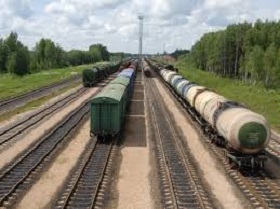Cargo, Latvia, Lithuania, Logistics, Railways, Transport
International Internet Magazine. Baltic States news & analytics
Tuesday, 16.12.2025, 06:02
LGC Cargo gets no permission to carry freight across Lithuania
 Print version
Print version |
|---|
LGC Cargo, whose shareholders and managers include Stasys Dailydka, a former CEO of Lietuvos Gelezinkeliai (Lithuanian Railways), has unsuccessfully tried to secure permission for freight transportation from Lithuania's border with Latvia to its border with Kaliningrad since the launch of operations a year and a half ago.
The Transport and Communications Ministry believes that LGC Cargo's plans pose a threat to national security and fair competition.
Deputy Transport and Communications Minister Ricardas Degutis says Lithuania's Railway Transport Code provides an exception for transit shipments.
"Transit shipments are an exception in Lithuania, given certain risks involved in shipments from Russia to Kaliningrad Region," Degutis told BNS.
"Lietuvos Gelezinkeliai also handles certain military and passenger transit, and, therefore, we apply higher requirements for the transportation of other types of freight, too. According (to these requirements), only state enterprises can handle such shipments. This ensures the (necessary) level of control," he said.
The transportation of any type of freight or even passengers from Russia by trains may involve risks, the official said, adding that there have already been precedents.
LGC Cargo last year failed to obtain capacities for freight transportation from the border with Latvia and the border with Belarus to the border with the Russian exclave. LTSA requested proof that it would not ship transit freight on these routes, but the company said it did not have such proof and was under no obligation to provide it.
"The refusal to provide the company with the capacities was based on two criteria. (The first criteria is) overcrowded infrastructure, because priority is given to those who ship more, and the other is that we had reasonable suspicions that there might be signs of transit," LTSA Deputy Director Justas Rasomavicius told LETA/BNS.
LGC Cargo CEO Sergey Grachev and Tomas Kersis, its logistics manager, say the company has no plans to transport transit freight.
"Our goal is freight transportation in Lithuania. The capacities we were allocated with are to nowhere. If there's a shipment from Latvia to Lithuania, we won't be able to handle it," Grachev told.
Kersis said the company wants to ship freight from Latvia to Lithuania, from where it would go to Poland via Kaliningrad, adding that this is not a transit shipment.
He did not deny that the company would also be interested in transporting coal, oil products and fertilizers from Russia or Kazakhstan through Lithuania and Kaliningrad to Poland, saying these would not be transit shipments either.
"(If it were) from Russia to Kaliningrad, that would be transit," he said.
LGC Cargo's executives say the company's operations in Lithuania are being hindered, claiming that the Communications Regulatory Authority has been examining its complaints for months, that Lietuvos Gelezinkeliai dragged its feet in talks on a contract and that LTSA demands proof it cannot provide it with.
Therefore, the company's shareholders and managers decided to complain to the European Commission.
The Transport and Communications Ministry has informed several parliamentary committees about LGC Cargo's situation and its intentions. From the information available to LETA/BNS, these documents say, among other things, that the railway logistics business involves threats and risks to national security and fair competition.
LGC Cargo's plans were last year examined by a government commission for deals of importance to national security. At Lietuvos Gelezinkeliai's request, the commission began to vet the state railway company's planned contract with LGC Cargo on the use of railway infrastructure, but terminated the procedure last October.
Based on information collected by LETA/BNS, LGC Cargo is linked to Russian Railways via its Latvian shareholder.
LGC Cargo is 51% owned by Baltic Transit Service, whose largest shareholder is Riga Commercial Port. According to Latvian media reports, the latter company is indirectly controlled by the families of Latvia's former Prime Minister Andris Skele and former Transport Minister Ainars Slesers.
The families indirectly hold 60 percent of shares in the logistics group Latvijas Transport Grupa. The latter has invested in Euro Rail Cargo and Euro Rail Trans, which have also attracted investment from the Russian Railways Group's companies. Also, Ivars Sormulis, chairman of the management board at Baltic Transit Service, is among the top executives of Latvijas Transport Grupa and has been mentioned in the Latvian media as an indirect shareholder of the company.
Apart from LGC Cargo, Gargzdu Gelezinkelis (Gargzdai Railway), a company owned by Igor Udovickij, the owner of Biriu Kroviniu Terminalas (Bulk Cargo Terminal), also wants to transport freight from Belarus to Klaipeda. However, Gargzdu Gelezinkelis has only a part of the requested capacities, too, and it cannot ship goods across Lithuania. Latvia Railways has withdrawn its request for capacities. That means that Lietuvos Gelezinkeliai maintains its monopoly on Lithuania's freight and passenger rail transportation market.








 «The Baltic Course» Is Sold and Stays in Business!
«The Baltic Course» Is Sold and Stays in Business!

